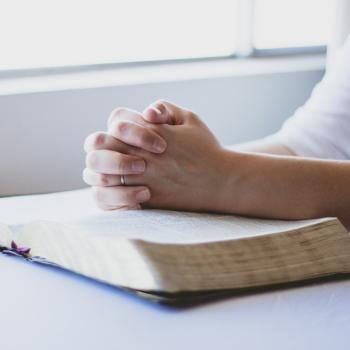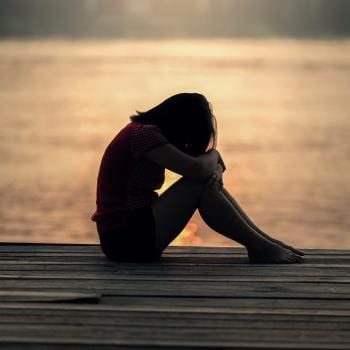I rarely comment here on the goings on in the atheist community. I’m torn, really. On the one hand, a big part of me wants to go to the conferences everyone talks about, and I do occasionally participate in events with local atheist groups. On the other hand, when I watch things like elevatorgate, or the brouhaha over whether sexual harassment policies are even necessary at conferences, well, it’s a bit of a turn off. The thing is, atheism doesn’t have a catechism or a statement of faith or a list of required positions on social issues. While this is only natural, it does have consequences, especially when it comes to forming any sort of cohesive atheist community or movement.
Think about it this way. Do we have “I don’t believe in fairies” clubs? No. We just…don’t believe in fairies. And that’s it. And if we did try having “I don’t believe in fairies” clubs, what would everyone even be united by anyway? What would they have in common? Common politics? Common beliefs about gender roles? Common positions on LGBTQ rights? No. Nothing. Nothing at all except their lack of belief in fairies.
Now of course, there is a bit of a difference when it comes to atheists living in the U.S. First, our culture is so predominantly religious, especially in certain areas of the country, that those who aren’t religious often feel the need for a sort of support group. And because of the Christian Right and the mixing of religion and politics by evangelicals and fundamentalists.
So back to the fairies thing. What if the majority of people in the country believed in fairies, and you were seen as strange and out of place if you didn’t? What if some (not all, just some) of the people who believed in fairies were trying to legislate based on that? In that case, there would be reason for local “I don’t believe in fairies” groups and national “I don’t believe in fairies” clubs.
But you know what? There still wouldn’t necessarily be anything uniting those who didn’t believe in fairies beyond their lack of belief in fairies – and their desire both to make not believing in fairies more acceptable to the country at large and to stop those who believe in fairies from legislating based on that.
And I think that’s a problem for those working so hard to create an “atheist community” or an “atheist movement.” As atheism has grown and gained more of a presence, shouldn’t be a surprise that these issues are coming up. Why? Well, if the lines defining the atheist community are drawn along the lack of belief in God, those within the community are a diverse lot that don’t actually all agree on, well, pretty much anything. And naturally, there are those who are racist, misogynist, classist, and/or homophobic in addition to those devoted to social justice issues. This shouldn’t come as a surprise, given that there is no social justice requirement to be an atheist – all that is required is that one not believe in God.
After everything unleashed by elevatorgate and sexual-harassment-policy-gate (what are we calling it?), to be perfectly honest, the idea of attending an atheist group or at an atheist conference where the only definition is a lack of belief in God makes me nervous. I would wonder if those around me really shared my values, values based not on the fact that I don’t believe in God but rather in the value I place on human beings. Having come out of a misogynist Christian culture, I don’t want to find myself part of a group that contains misogynists or homophobes. I rank my commitment to humanism and social justice higher than, well, basically anything else.
If someone shares my commitment to humanism and social justice, I throw my hat in with them. If not? I don’t. They’re not my allies. It doesn’t matter whether the believe in God, gods, or no God at all. They’re not my allies. And there is no way in heck I’ll find myself working with someone who opposes social justice issues like feminism. Just. Not. Happening.
When I first left the political right and stopped believing in God, I thought that everyone else in the atheist community shared my newfound humanist social justice values. I saw it as a safe space, a place peopled by allies. I threw in my lot unequivocally, and with excitement. I was naive, and I was wrong. Elevatorgate and everything since then has made that obvious.
Not all atheists are my allies, I know that now. In fact, lots of atheists “don’t get it” the same way the patriarchal Christians I grew up among “don’t get it.” Let me quote from Natalie Reed’s excellent post on this topic.
Any kind of Atheist Movement would by necessity be primarily composed of people who’ve chosen to prioritize atheism and secularism as a particularly important part of their lives and activism. At first how I assumed this went was people generally thinking “secularism is one of many important issues presently going on, and one that I happen to feel especially passionate about, so that’s where I’m going to be put a significant chunk of my energy and attention”. Cool. And I’m sure lots of atheists do have that as their approach. I’m fine with that, and think it’s important, because we do need a contingent of activists putting significant energy into maintaining political secularism and helping prevent the emergence of theocracy. But lately it seems to me that a much more significant percentage than I’d assumed are people thinking “atheism is the most important issue, so that’s the one I’m going to focus on”.
Or, worse, when considered in light of the demographics that comprise the movement, “atheism is the only real civil rights issue, because I’m not personally affected by, and haven’t personally seen, any others, so they must either not exist or not really matter. DAWKINS RULES!”
The creepy thought that the reason a lot of outspoken, committed, passionate atheists are choosing this as their arena is because they’re too selfish, too entitled, or too sheltered, to allow any other issues to really matter to them. That they choose this ONE civil rights issue to dedicate themselves to, because it’s the ONLY legitimate civil rights issue that actually effects them, secure in their absence of ovaries, melanin, exogenous hormones, medical devices/supports, welfare checks, track scars and rainbow flags.
The sad thing is…she’s right.
I have thought before about the fact that being an atheist is the only way a straight white middle class cis men can face discrimination. I mean, think about it: outside of not believing in God, they have every ounce of privilege there is. I had thought that that would make them feel more sympathetic toward groups with less privilege who face other forms of discrimination, and I’m sure that for many it does. But as elevatorgate, etc., revealed, there are plenty for whom this is not the case.
The thing is, straight white middle class cis atheist men do not face the same sort of discrimination that I, as a woman, or Natalie, as a trans woman, do. Sure, there are chaplains in legislatures and “In God We Trust” is on our money and people are less likely to vote for atheists than for any other group, but do straight white middle class cis atheist men have to deal with the personal reality that de facto discrimination based on gender in hiring and promotion decisions remains extremely real (here’s an example), or that there is no requirement for paid maternity leave in this country? Do they have to face a reality where they are not legally protected from discrimination in the workplace and in housing, or where they are not allowed the legal privileges that come with marriage, all of which affects LGBTQ individuals on a daily basis? No. They don’t.
The reality is that while many straight white middle class cis atheist men are extremely sympathetic to social justice issues and prioritize things like feminism and LGBTQ rights, plenty of others aren’t and don’t. Shortly after reading Natalie’s article, I read the Friendly Atheist’s take on it, in which he discusses how many female atheist activists are experiencing “burn out” because of all the misogyny and such that has come out of elevatorgate, and the second comment on the post caught me in the gut – and proved Natalie’s point exactly:
I don’t engage is this pedantry and nonsense, so I’m not worried about burning out. We have a common enemy out there and it seems like the blogs do nothing but attack other atheists most of the time. It’s kind of silly and creates massive fights as people feel the need to defend themselves once they’re pot committed.
I concentrate on what actually matters: separation of church and state, civil rights for non-theists, and true freedom of religion, which means freedom from religion as well. There is enough stupidity out there in theocracy land to fuel my activism for eons.
Arguing against misogyny in the atheist community is “pedantry and nonsense” while the separation of church and state is “what really matters?” You see what I mean? This is what Natalie was talking about. The straight cis atheist man who left this comment likely sees fighting for the civil rights of non-theists as “what actually matters” because, well, this is the only form of discrimination he personally faces. Because of his privilege he doesn’t face what I or Natalie face, and he therefore doesn’t see issues like feminism or LGBTQ rights as important or something that “really matters.”
All it takes to be an atheist is not believing in God. There’s no social justice or humanist requirement. The reality is that as long as the lines of the atheist community are drawn simply based on not believing in God, there will be atheists who oppose humanist and social justice issues and atheists who “don’t get it” when it comes to women’s rights, LGBTQ rights, and on and on. This shouldn’t come as a surprise, really. But as someone who was burned and burned badly by patriarchy, it’s maddening. I thought that I’d gotten away from the misogynist and homophobic crap when I left religion. The last place I want to see it crop up is somewhere I had originally (back in my naive days) thought was a safe place – the atheist community.
Thinking about all of this has only reaffirmed something I really already knew: I am a humanist first and an atheist second. While I can know that other atheists share my opposition to the mixing of religion and politics, I can’t be sure they share my humanism or my support for social justice issues like feminism. And personally? I care a bit more about my access to reproductive healthcare and about creating a world where Natalie Reed doesn’t have to worry about employment and housing discrimination, and worse, than I do about whether there’s a manger scene in front of my town’s courthouse this Christmas.
Now, having said all this, there are those in the atheist community who appear to be working to draw the lines slightly differently. They seem to want an atheist community where the lines are based on a lack of belief in God but also on a commitment to social justice, especially when it comes to issues of race, sex, sexual identity, and class. The groups I know of offhand who appear to be working on this goal most tirelessly are the bloggers at FreeThought Blogs and Skepchick. And I’m glad of that. I would feel completely comfortable joining a group or attending a conference that was united not simply by a lack of belief in God but also by a commitment to humanist values and social justice issues. I do have to wonder, though. Is such a group simply “an atheist group,” or is it something more, something that perhaps needs a new label with a definitive definition that includes humanism and social justice issues? Because that I could get behind equivocally.














